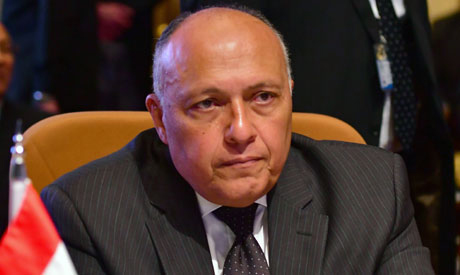
Egyptian Foreign Minister Sameh Shoukry (AFP)
Egypt looks forward to an invitation by DR Congo’s President Felix Tshisekedi to resume the negotiations on the Grand Ethiopia Renaissance Dam (GERD) sponsored by the African Union, Foreign Minister Sameh Shoukry said on Wednesday.
In remarks to Sky News, Shoukry affirmed the importance of Egypt, Sudan and Ethiopia resuming the GERD negotiations in a framework that is strengthened by the participation of international observers.
Shoukry said Egypt has repeatedly proven its good faith and readiness for negotiation, though he stressed that the GERD talks should not be endless.
“The [UNSC’s] presidential statement affirms the need to reach a legally-binding agreement quickly and within a specific timeframe,” Shoukry said.
Egypt’s top diplomat hailed the role of the international community in the GERD file as “indispensable,” especially that of influential countries.
Shoukry affirmed that Egypt’s bilateral meetings with other countries reflect understanding of the existential nature the Nile to the downstream countries and the need to reach an agreement.
“We do not demand any deviation from the rules of international law and the practices followed by many countries managing transboundary rivers,” Shoukry said.
“These same rules should be applied to the Blue Nile… and a binding legal agreement should be reached,” Shoukry affirmed.
Rounds of AU-sponsored talks to resolve the decade-long dispute between Egypt, Sudan and Ethiopia have collapsed, with Egypt and Sudan expressing grave concerns about the potential impact of the GERD.
Egypt and Sudan’s call for a legally-binding agreement on the filling and operation of the dam have been resisted by Ethiopia, which implemented the second phase of filling the dam’s reservoir unilaterally in July without an agreement.
However, as the UN Security Council issued a presidential statement earlier in September encouraging the three parties to return to the AU-sponsored talks to reach a deal, the three countries have expressed readiness to resume the talks.
Implementing the Libya roadmap
When asked about the Libyan situation amid the recent developments, including Libya's eastern-based parliament’s decision to withdraw confidence from the unity government on Tuesday, Shoukry affirmed the need to implement the Libyan agreements, as scheduled, by the end of the year.
Shoukry said the roadmap agreed upon by the Libyan Political Dialogue Forum earlier and supported by the UN Security Council is still adopted by the international community.
The UN-sponsored forum selected the Government of National Unity headed by interim Prime Minister Abdul Hamid Dbeibah in February and mandated its roadmap to hold the Libyan parliamentary and presidential elections on 24 December.
Shoukry referred to a meeting on Thursday on Libya called by Germany, France, and Italy and attended by the United States and neighbouring countries on the sidelines of the 76th session of the UN General Assembly (UNGA).
The FM said all speakers at the meeting affirmed the importance of implementing the outcome of the Libyan Political Dialogue Forum, at the top of which is holding the elections as scheduled on 24 December.
Prioritising Arab security
Shoukry affirmed that Egypt prioritises achieving Arab national security, ending all conflicts in the region and achieving stability in Libya, Syria, Iraq and all countries in the region.
Egypt is also keen to see a solution to the Yemeni crisis and for Gulf national security to be preserved.
“These are the issues that always concern us and that we work on tackling,” Shoukry said.
The Egyptian FM also affirmed prioritising achieving stability, peace and security and refraining from all practices that lead to foreign interference in the Arab region.
“The Arab countries are able to face common challenges, and foreign powers that are trying to extend their influence and control over the region must stay away from these practices,” Shoukry added.
Short link: